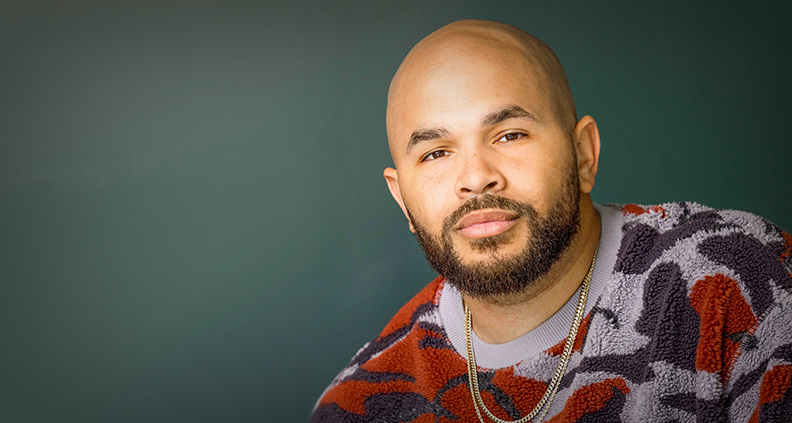Member Lens: How Fellow Hank Jones Structures Stories and Career
Our ongoing Member Lens feature spotlights current Film Independent Members to see how they got started, where they are now and what being part of Film Independent means to them. This month: screenwriter Hank Jones.
***
It’s great when filmmaking can be a family affair, which is why we’re excited to kick off the 2024 edition of our community spotlight series with writer Hank Jones. Because in addition to working as a supervising producer on the ABC procedural Will Trent and being part of Film Independent’s Project Involve and Episodic Lab, Jones is also the spouse of last July 2023 Member Lens subject Thembi Banks. But while Banks’ trip through Fi Artist Development may have laid the groundwork for Jones to follow, his narrative perspective–and desire to tell stories rooted in universal truth–are uniquely his own.
Hailing from the outskirts of Philadelphia with no obvious showbiz ins, Jones still took the leap and moved to LA–where he soon found himself ascending the ranks of the TV writers room and impressing showrunners with his natural talent for humor while working hard to master the mechanics of story structure. Now with his sights set on directing, Jones is eager to get to work after a long, strike-impacted 2023.
We caught up with Jones late last year to talk about coming to terms with his identity as a screenwriter, the best jokes from his Office spec script and–as always–how being a Film Independent Member and Fellow continues to be an integral part of the story.
HANK JONES

Let’s start at the beginning. How did your interest in film begin to develop?
Jones: I grew up in Ambler, Pennsylvania–about 10 minutes outside of Philly. I did sports because my parents told me to. I tried playing the violin in the third grade. But it was always difficult getting up enough energy to really care about anything outside of film and television. In middle school, I would go to Movie World, not Blockbuster, and pick a movie and sort of do my own little screening series every weekend. In the summertime, my mother tried to limit our screen time, so she said, “Alright, if you’re going to watch movies, you’ve got to write essays about them, too.” Kind of like a synopsis; a movie review, basically. So I was [writing] these reviews very young.
Was there one particular movie that made you think about filmmaking from a storyteller’s perspective?
Jones: When Out of Sight came out in like 1998, that one really struck a chord with me because of the nonlinear storytelling. I really just responded to it–like, I noticed everything, whereas before I would just watch a movie [passively]. After that, I really started paying attention to dialogue and story structure. There’s a great scene in that movie where George Clooney and J. Lo are having a drink and you see the snow in the background–I love everything about how that scene made me feel.
So at this point you’re a budding film critic. At what point did that fully switch over into wanting to write for the movies?
Jones: Coming from Ambler, I didn’t really know anybody in the business. I was reading Thembi’s piece and you know, Thembi’s from New York. She went to LaGuardia High School, so she was immersed in that world from such a young age. But for me it was so foreign, I didn’t have any frame of reference. I just tried to find practical ways of writing. I was living in the DC and at this point I’m in grad school working at a tax publication with dreams of getting to The Washington Post. But I was kind of pretending to be a scriptwriter on the side. I was reading a lot of books about writing and going to a lot of seminars and film festivals. I wasn’t really sure what I was doing.
What were some screenwriting books or scripts that you found particularly instructive?
Jones: Well, the first book I read was Story, by Robert McKee. And I’m sorry, Mr. McKee, but it did not resonate with me. Then, of course, there’s Save the Cat. But the one that really hit the most, that I still use today, was Into the Woods: A Five-Act Journey into Story, by John York. That one just really articulated writing in a way that made me comprehend it. I recommend that to anybody who’s reading.
After you moved to LA, what would you consider some of your earliest real gigs in Hollywood?
Jones: The first one was an internship at a literary management company. Without that I wouldn’t have gotten my first TV job, as a writers’ PA on the show The Game on BET. I was there for two seasons. I started out getting lunches and coffee for all the writers and doing any kind of miscellaneous errands that they needed. But in between that I was learning how to write. I was very self-conscious, because I never went to film school, so I was just learning on my own. I was always asking questions. Kenya Barris was the first writer to ever read something I wrote. I wrote a spec script for The Office and he told me, “You’re funny, that’s good–you can’t teach funny. But you need to figure out structure, watch us in the room and figure out how we’re beating out these stories.”

I have to ask: what happened in your Office spec?
Jones: It was, like, a March Madness episode. They converted the warehouse into ground zero for watching basketball, with all these different monitors and things. Michael Scott was going to be a big fan of college basketball because somebody once told him he looked like Mike Krzyzewski. I had a great line: Michael was going to say: “Great minds look alike.”
That’s a perfect Michael Scott line. Kenya was right: you are funny. So now your career is developing–at what point did you become aware of Film Independent?
Jones: It was like a year into being in LA. I’d gotten into the second round of this TV writing program called The Cosby Fellowship, which needless to say doesn’t exist anymore. But the woman who was interviewing me was asking me questions about why I applied. I didn’t know too much about anything outside of this Cosby Fellowship, because a bunch of my friends had done it. So she was trying to explain to me how many resources were available to me and mentioned Film Independent. I walked away from that meeting knowing that I wasn’t going to get the fellowship, but it did make me go look into Film Independent.
Tell me about the process of applying and getting into Project Involve.
Jones: Thembi and I had started dating and she had gotten into Project Involve. So I had a front row seat to everything she was doing. She’d come home and tell me about the classes or her mentor and the fellowship she had with other creatives. I got to watch her go through the whole process of making her short film. And I was just like, “Oh, I have to do this.” So I applied the next year and got in.
What was your biggest takeaway from Project Involve?
Jones: The biggest thing is just the community. I didn’t go to film school, so before Project Involve if I wanted to go shoot something on my own, I wouldn’t know where to go. But now if I want to shoot something I know exactly who I’m going to call.
As a Member, what do you feel you continue to get out of being a part of the Film Independent community?
Jones: I just love seeing the new crop of Fellows that comes up every year, and the projects they’re making. I like to be involved as much as I can with the screenings–I want to see the work. I want to see what these creators are saying, what they’re passionate about. It’s just a way of staying involved in the community in a way that’s about more than just content. It keeps me honest as a creative and keeps me pushing myself to dig deeper to find stories that are so personal to me they’re embarrassing. But are stories I need to share because I’m not the only person going through that.
Film Independent promotes unique independent voices by helping filmmakers create and advance new work. To become a Member of Film Independent, just click here. To support us with a donation, click here.